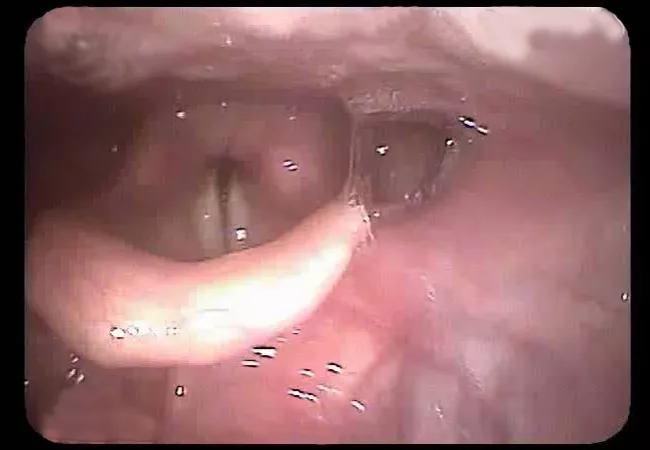Planning avoids surprises, improves outcomes

Image content: This image is available to view online.
View image online (https://assets.clevelandclinic.org/transform/cb6b36c4-0869-497b-8d7e-6f0ceae4c9c0/18-ENT-914-Scharpf-Hero-Image-650x450pxl_jpg)
18-ENT-914-Scharpf-Hero-Image-650x450pxl
Thyroid cancer is one of the fastest growing cancer diagnoses in the United States, tripling in incidence over the past 30 years. Much of the increased incidence can be attributed to improved and widespread diagnostic testing with ultrasound and fine needle aspiration biopsy.
Advertisement
Cleveland Clinic is a non-profit academic medical center. Advertising on our site helps support our mission. We do not endorse non-Cleveland Clinic products or services. Policy
And while mortality rates for thyroid cancer remain low, complacency in the management of these patients can result in recurrence and poor outcomes, particularly in more advanced cases, according to a Cleveland Clinic otolaryngologist. A multidisciplinary approach in preoperative planning and postoperative management is necessary to improve outcomes for patients with more advanced thyroid cancer.
“We’ve seen an epidemic rise in thyroid cancers. It’s one of the most common cancers in women,” says Joseph Scharpf, MD, FACS, Director of Head and Neck Endocrine Surgery in the Head and Neck Institute. “Our center is seeing many advanced cancers that might be more susceptible to recurrence and invasion, and require a more aggressive approach.”
Surgery is the mainstay of treatment for thyroid cancer, with total thyroidectomy and appropriate neck management serving as the standard of care. But the approach to surgery should begin with the preoperative evaluation to optimize patient outcomes since most patients are asymptomatic, which can lead to surprises during surgery regarding the extent of disease.
While the primary goal of surgery is complete resection of local disease, protection of the central neck to maintain the airway, voice and swallowing is critical.
Dr. Scharpf emphasizes the importance of preoperative planning to avoid surprises and the discovery of a more aggressive type of cancer than anticipated prior to surgery.
“I see cases where patients have had recurrences or more advanced cancers that caught physicians unaware and required more than a thyroidectomy,” he says. “They may require a tracheal resection or more extensive neck surgery.”
Advertisement
The evaluation should not end with ultrasound. A workup may include esophagoscopy, tracheoscopy, broncoscopy and diagnostic laryngoscopy. The most recent American Thyroid Association (ATA) guidelines recommend cross-sectional imaging using CT or MRI for suspected advanced disease.
Cleveland Clinic’s thyroid care team relies on a multidisciplinary team of endocrinologists and thyroid surgeons, as well as experts from pathology, radiology, medical oncology and genomic medicine. In collaboration with Cleveland Clinic Taussig Cancer Institute, patients have access to a wide variety of treatment options, including clinical trials.
Studies also indicate significant benefits to patients treated at high-volume centers for thyroid and parathyroid surgery, including fewer complications and improved outcomes. At Cleveland Clinic, surgeons can perform more aggressive resections that may require local or regional tissue transfer, free flaps and airway reconstruction surgeries. The center also regularly uses nerve monitoring to optimize the surgery.
“A life-threatening situation can arise if both recurrent laryngeal nerves are compromised during surgery, causing airway obstruction – the patient can’t breathe and may need a tracheotomy,” Dr. Scharpf says. “Intraoperative nerve monitoring helps to manage those patients who have a nerve on one side that is invaded, and you need to make a decision on whether to stage a surgery or be ready to manage that airway more effectively.”
Cleveland Clinic’s multidisciplinary tumor boards also provide an added layer of diagnostics.
Advertisement
“More advanced cancers are discussed at a tumor board,” Dr. Scharpf says. “It builds in multiple opinions that are valuable for patients.”
Intraoperative nerve monitoring (IONM) in thyroid surgery is a major emphasis at Cleveland Clinic.
Dr. Scharpf chairs the American Academy of Otolaryngology’s task force on Neural Monitoring for Head, Neck and Thyroid Surgery. The task force developed an AAO-Head and Neck Surgery- approved position statement on IONM of the recurrent laryngeal nerve (RLN) in thyroid and parathyroid surgery, as well as all cranial nerves susceptible to injury in head and neck surgery.
In the majority of nerve injuries, he says, the nerve appears anatomically intact, but that doesn’t necessarily mean the nerve is functional. In thermal, traction or compression injuries, the RLN may appear structurally sound, but a functional assessment of the nerve using IONM is necessary to identify nerve injury.
Beyond prognostication, it can aid in nerve mapping in revision cases where there is intense scar present from prior surgery. It may possibly lead to earlier identification of key nerves, and perhaps most importantly, aid in the intraoperative decision-making process for staging surgery to enhance safety.
“It’s an integral component of thyroid surgery,” Dr. Scharpf says. “We’re trying to move away from the standard of simply anatomically seeing the nerve intact, but rather we need to have functional information regarding the nerve.”
While nerve monitoring is a standard of care in some countries, it is not yet the standard in the United States. But there is a significant increasing trend in its use, particularly among high volume centers.
Advertisement
Advertisement
First-of-its-kind research investigates the viability of standard screening to reduce the burden of late-stage cancer diagnoses
Global R&D efforts expanding first-line and relapse therapy options for patients
Study demonstrates ability to reduce patients’ reliance on phlebotomies to stabilize hematocrit levels
A case study on the value of access to novel therapies through clinical trials
Findings highlight an association between obesity and an increased incidence of moderate-severe disease
Cleveland Clinic Cancer Institute takes multi-faceted approach to increasing clinical trial access 23456
Key learnings from DESTINY trials
Overall survival in patients treated since 2008 is nearly 20% higher than in earlier patients